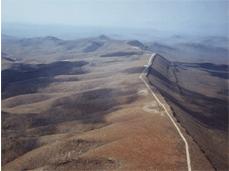 Ultimate Job Security by Bob Ciminel
Construction of a national waste repository was mandated by Congress after the Three Mile Island Accident in March 1979. Along with the creation of the repository, Congress also tasked the Department of Energy to take possession of the spent nuclear fuel stored at the various power plant sites throughout the United States. The DOE did not keep its end of the bargain; consequently, nuclear utilities had to "re-rack" their spent fuel storage pools to increase their capacity and build interim storage facilities, called dry cask storage, until such time when the fuel can be shipped to a Federal repository. This issue of "what do we do with spent fuel" arose because former President Jimmy Carter issued an executive order banning the reprocessing of commercial spent fuel in the United States. The Yucca Mountain Repository has been tied up by political activists for the past 25 years because the words "nuclear" and "safe" are used in the same sentence. By definition, anything related to nuclear power is unsafe and can never be safe. How anyone can rationalize that it is safer to store spent nuclear fuel stored at over 125 different sites around the country instead of burying it beneath a mountain in the Nevada desert has to be the epitome of shortsightedness, a common ailment afflicting politicians. Shortsightedness may be endemic among politicians, but Washington's bureaucrats are immune to it, as evidenced by the most recent impediment to approving the Yucca Mountain Repository. The Environmental Protection Agency is proposing that the repository has to be regulated by the Nuclear Regulator Commission for one million years. Yep, that's correct, 1,000,000 years, the equivalent of 25,000 generations. I'm not a biologist, but I suspect that 1,000,000 years from now our progeny will not resemble us, nor will they be the same physiologically. Evolution, or intelligent design if you wish, has a way of changing living organisms. Our bodies, for example, are slowly adapting to toxic materials that did not exist before the Industrial Age, one of which is radiation produced by nuclear reactions, such as splitting the atom. Think about it. After one million years of exposure to the plethora of pollutants mankind generates every day, why should we worry about someone being exposed to what is equivalent to the background radiation a resident of Denver, Colorado receives every year. The Nuclear Regulatory Commission
isn't sure how to develop regulations to cover the one-million-year
monitoring period for the Yucca Mountain Repository. No government
agency has ever regulated anything for that long. However, you
can be sure the bureaucrats in Washington will rise to the challenge.
We should be worried that other government agencies may try
to outdo the NRC. Listen! You can hear the conversation going
on at the IRS right now. "Hey, if the NRC can do it, so
can we. Let's propose taxation ad infinitum!" He assumes informed readers will be able to tell the difference. ciminel@sitnews.us
|
||
